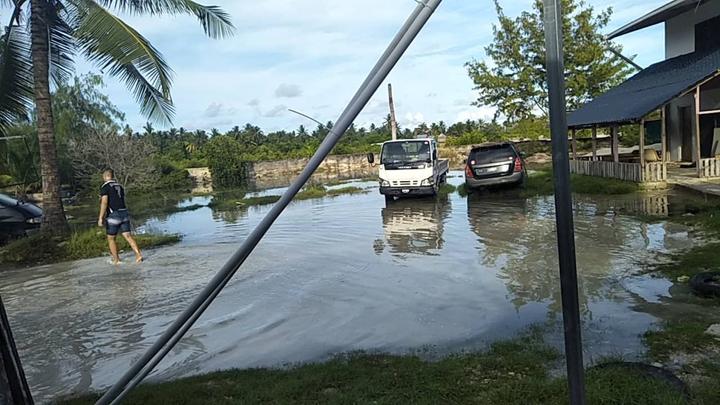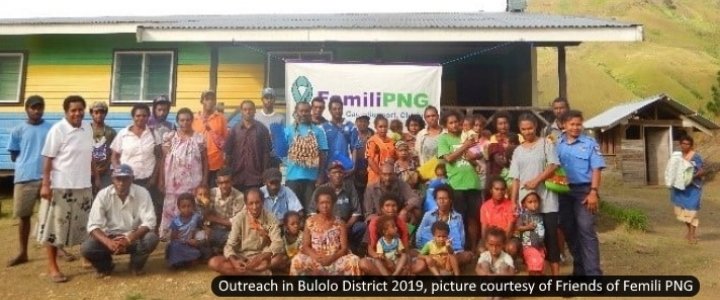Quality Principle 7 (Governance) may not be the most exciting of the ACFID Code Principles but having the right governance structure, board and contextually-based decision-making framework is essential to the effectiveness of development interventions and safeguarding.
Friends of Femili PNG is one of ACFID’s newest and smallest members. We work with Femili PNG and other organisations to assist survivors of family and sexual violence in PNG to access services such as counselling, medical support, emergency accommodation, police and court intervention, and many more. We primarily support survivors of intimate partner violence, sexual violence, sorcery accusation-related violence and child abuse. Femili PNG also conducts training and outreach in communities, businesses and schools throughout PNG.
Femili PNG is an NGO incorporated in PNG, and employs 47 staff across two locations in Lae and Port Moresby. With the exception of our CEO, all staff are PNG nationals. Based in Canberra, Friends of Femili PNG employs one staff member and several volunteers.
Both organisations are managed by the same governing board and share the same Executive Management Committee (EMC), which is our main decision-making forum.
Our governance structure is unusual but innovative (the Code asks members to define how their organisation is governed and how it operates at 7.4.2). On the one hand, we invest in local ownership, work within local structures, develop local staff and promote program sustainability. On the other, we have an Australian presence to mobilise Australian resources and expertise to help PNG meet its development challenges.
Our structure works because of the diversity, expertise and commitment of our board. All are non-executive members, and the majority are women. We value the range of technical expertise on the board – from experienced development practitioners to public, private and civil-society leaders, to social workers and management experts. Our policy is that at least half our board should be PNG nationals. This is consistent with the principle of national ownership, but also brings several practical advantages, including a deep understanding of our operating context. Having some board members working within law and justice sectors in PNG and others with relevant Australian experience means that we have ready access to advice from a variety of perspectives. Likewise, our board members can use information from our staff and the experience of our clients to advocate for policy reform.
The diversity of our board is useful given the risk environment within which we operate. Our staff are subject to threats, our clients are vulnerable and many are in situations of extreme risk. Strong safeguard policies are critical, and having a board which combines subject-matter and contextual knowledge is invaluable. Board incident reporting procedures inform our regular policy and procedure reviews. For example, medical emergencies in the safe house and protests causing disruptions to staff and client movement have led to new procedures in our Security Manual relating to health security and political instability. All staff take part in an annual review of our key safeguard policies, and the board reviews our risk management and security policies every six-months.
It isn’t easy to manage a transnational board, and it isn’t the cheapest option. While PNG internet quality is still a binding constraint, technology does help. We supplement face-to-face meetings with teleconferences. A particularly useful mechanism is our EMC WhatsApp group which allows management in Lae, Port Moresby and Canberra to report incidents, provide updates and seek advice at any time (this also assists our compliance with Code indicator 7.4.4, that of reporting serious incidents to our governing body). We minimise travel costs, but it is useful to get our board into the field.
These days, there is a lot of talk about diversity and partnership. At Femili PNG and Friends of Femili PNG, we’ve structured our governance to embody these principles. We think they work for us, delivering practical results, including better advice, better advocacy, and better safeguarding.

Tarawa street scene with a king tide on Friday, 30 August 2019. Image: Pelenise Alofa/KiriCAN
Gender is not irrelevant to disaster risk reduction and climate change. Impacts differ across populations. Disasters and other emergencies have specific and substantial impacts on women and people of diverse sexual orientation, gender identity and expression. These impacts are also exacerbated by climate change. Emergencies substantially increase the risk of sexual and gender-based violence, including domestic violence, sexual harassment, early marriage and trafficking. Sexual and reproductive healthcare during emergencies, including provision of safe and dignified menstrual hygiene management, is lifesaving. Addressing the needs of women and people of diverse sexual orientation, gender identity and expression during emergencies can be achieved by adopting an intersectional approach to disaster preparedness, risk reduction, response and recovery.
Coherent and coordinated gender responsive national policies and programs are essential to support gender equality and sustainable development. This is backed up by research into gender-responsive climate responses which found that integrated approaches to climate change that drive transformative change in gender relations must value women’s localized and traditional knowledge; support women’s participation in decision making; resource women’s collective action; and address unequal gender norms.
CSW will be highlighting best practices, sharing knowledge, highlighting the critical role of women and girls at the heart of climate resilience, food security and mitigation and adaptation. Gender inequality leads to disproportionate impacts on women and girls. Policies and programs need to address the structural inequalities and power imbalances for women and other marginalized groups to adapt to climate change.
Greater attention must be given to specific needs of women and girls and access to resources and meaningful participation in decision making. Gender must be integrated into the design and implementation of measures. Women and girls’ inequalities and discrimination faced in the impacts of environmental damage and climate change impacts must be reflected in policy debates and practical actions. Gender equality and tackling inequalities must be placed at the heart of climate solutions.
Join us in October for the ACFID Conference where we delve into the intersections between equity, inclusion and climate change.

Fiona Gunn
Fiona Gunn is the CEO of Friends of Femili PNG and the Development Manager of Femili PNG. She has been in this role since December 2018, after working in international development programs for the last eight years at the National Archives of Australia, DFAT, AusAID, and the Australian Public Service Commission. Prior to that, Fiona worked in the cultural sector in intellectual property law and screen culture. Fiona holds a Masters in International and Community Development from Deakin University. To read more about the work of Friends of Femili PNG / Femili PNG visit femilipng.org









